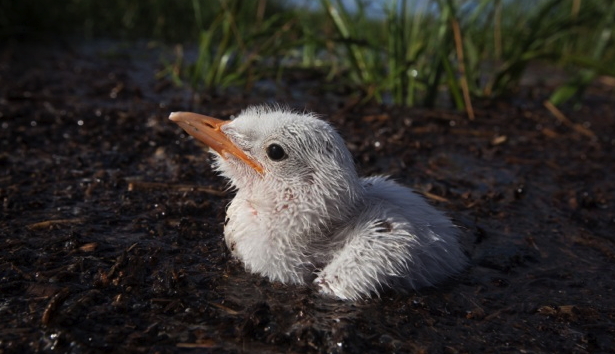A Louisiana official says the state's barrier islands are vanishing "like sugar in coffee." That's bad news for the waterfowl whose newly hatched chicks are being washed away.
 Julie Dermansky
Julie Dermansky
Two years after the BP oil spill, Louisiana is still grappling with its aftermath. I saw this firsthand during a recent visit to Cat Island, a barrier island in Plaquemeins Parrish. The oil spill killed the much of the vegetation that serves as a nesting ground for pelicans and other migrating waterfowl.
Cat Island's mangrove forests used to be impenetrably dense. You can walk through them with little effort now. Most of the island is underwater. Tree roots used to prevent waves from sweeping away the sand that holds the sediment in place, but with the death of many trees and marsh grasses, there's little habitat left for the nesting birds.
According to P.J. Hahn, coastal zone manager for Plaquemines Parish, Cat Island is disappearing like sugar in coffee. The island rookery serves as a nesting ground to seagulls, spoonbills, and egrets, but it is primarily populated by brown pelicans, Louisiana's state bird. The bird was only recently taken off the endangered species list; now, tragically, its numbers will again dwindle. Hahn estimates that the island has shrunk from four acres to one since the 2010 oil spill.
A project to save Cat Island and Cat Island East will cost the parish at least $1.4 million. The plan is to fortify the island by adding landmass and mangrove trees and protect it with a new 40-acre circular barrier. Shell Oil will provide the bulk of the funding, and Hahn is still actively soliciting donations.
I joined Hahn as he took a geologist and a Manchac Consulting Group team out to survey the area before implementing their plans in September. After tropical storm Debbie blew over, Hahn found only one baby pelican on Cat Island East. The high waters had destroyed many of the nests, killing most of the newly hatched baby birds I had photographed the week before. If a hurricane hits the area this season, it is possible there will be nothing left to protect by the time the barrier is scheduled to be built.
On June 29, Congress passed the Restore Act, which earmarks 80 percent of BP's Clean Water Act fines for Gulf Coast restoration. The federal penalties BP faces range from $5 billion to $20 billion, according to the Times Picayune. Even though the president signed the bill quickly, the funds will come too late to save many birds. But perhaps they will jump-start the fight against coastal erosion elsewhere.



















 In Focus
In Focus
Join the Discussion
After you comment, click Post. If you’re not already logged in you will be asked to log in or register.
blog comments powered by Disqus